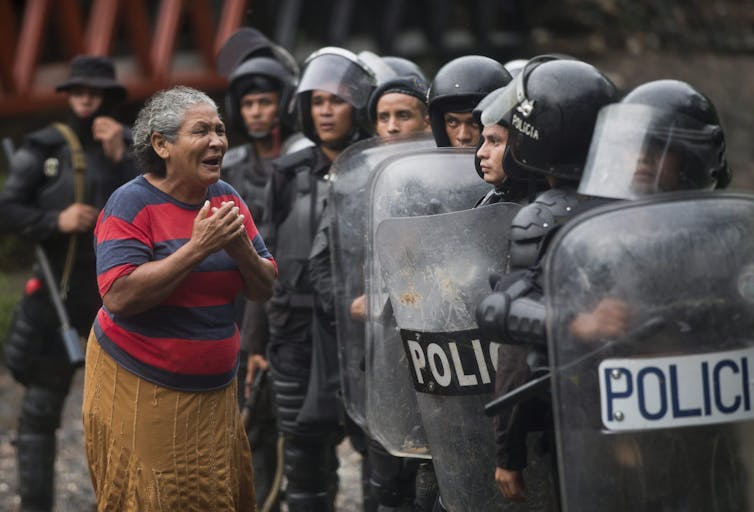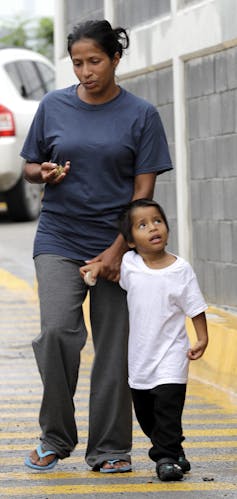By Alejandro Hernandez
A significant number of Central American migrants are likely Canada-bound due to the ongoing immigration and security turmoil in the United States.
Since people will keep migrating to survive, the associated risks and costs of migrating will also escalate.
Consequently, Canada needs to enact inter-related migration and foreign policy measures that take into account the reasons why people claim asylum. These actions must go beyond Band-Aid solutions and ineffective strategies.
Ineffective strategies include visiting Latino migrant communities in the U.S. to warn people against crossing the Canada-U.S. border at irregular border points.
Nor should we declare the entire Canada-U.S. border an official border crossing, a proposal rightly described in a recent article in The Conversation Canada as “a fantasy.”
Canada owes it to help Central Americans
Some might argue Canada isn’t responsible for what happens in other countries. Based on this assumption, some Canadians might believe we shouldn’t be responsible for refugees.
But Canada is not an isolated country. We have wielded our influence in the past over Central American countries, usually with detrimental results.
For example, Canada promptly supported the military coup d’état in Honduras in 2009. This was meant to preserve Canadian owners’ and investors’ capital in the mining, garment and tourism industries.

Some of those Canadian mining companies’ actions have led to environmental and human right abuses and displacements in these countries. Some face charges in various courts, including Canada.
We should not forget that under Stephen Harper’s government, Canadian taxpayers paid for personnel and embassies around the world to be converted into economic war rooms. As demonstrated by released government emails, the Conservatives defended Canadian companies abroad no matter how they conducted themselves.
Canada’s past interventions in some of these countries ethically binds us to care about what is happening now to their citizens.
Separating migrant children from parents
Planned since March 2017, the U.S. has been separating undocumented migrant children from their parents when detained at its southern border. As a result, as many as 11,200 children have been detained since last August.
These children have been interned under conditions that “look more like incarceration than temporary shelter.” Other children have alleged they were assaulted and suffered severe physical and emotional abuse while in detention.
U.S. President Donald Trump has signed an executive order to stop the separation process. But the American government has no plan yet for reuniting the separated immigrant families.
What’s more, as a class-action complaint against these youth detention centres asserts, the Trump administration’s actions are “part of a growing trend of punitive, racially discriminatory conditions.” This is part of Trump’s so-called “zero tolerance” policy at the U.S. southern border.
These policies are aimed almost entirely at deterring the migration of Mexicans and Central Americans. However, the policies and measures ignore the violence that these people face in their home countries.
Why are Central Americans fleeing?
There are extraordinary rates of murder, crime, impunity, extortion and forced gang recruitment in Central America. This is partly the result of gang networks operating in that region as well as in Mexico and the U.S.
Add to this mix the demand for cocaine and methamphetamine in Canada and the U.S.
That’s led the gangs to add international narcotics and weapons trafficking, along with human smuggling, trafficking and prostitution, to their criminal repertoire.
Nonetheless, the U.S. intends to withdraw Temporary Protected Status from approximately 200,000 Salvadorans in September 2019 and 60,000 Hondurans in January 2020.
The potential return of these migrants to their homelands will disrupt the economic and support systems generated by remittances between the U.S. and their countries of origin.
These migrants will be sent back to countries with massive income inequality and lack of health care, social services and educational opportunities. And this sad state of affairs in Central American countries is the historical result of U.S. foreign intervention, as well as internal conflicts in the 1970s and 1980s and the uneven effect of economic liberalization since the 1980s.
Impact of upcoming U.S. policy changes
Since June 11, gang violence (along with domestic violence) is no longer recognized as a reason to claim asylum in the U.S.
Furthermore, a bill being voted on in the House of Representatives, if approved, will substantially restructure the U.S. asylum system. It will also require further collaboration by other countries, including collecting and sharing travellers’ biometric data and tackling irregular migration flows that may affect the U.S.

The impact of these policy changes and the current conditions in Central America will be significant and could easily turn the region into a pressure-cooker.
They will also spur a re-evaluation process among some Central Americans regarding whether to migrate at all, or where to go. As scholar Ailsa Winton puts it, they will try to achieve “a complex balancing act of different kinds of harm.”
Canada then needs to develop a comprehensive migration management strategy that responds to more complex, international realities. This strategy should consider human development and not only homeland security.
Trying to stop people from migrating and disregarding the causes of migration is a futile exercise. As history shows, doing this only increases the risks and costs for everyone.
Canada has played a role in creating human misery in Central America. It’s time to do right by the region’s citizens as doors are slammed in their faces by the United States.
This article is republished from The Conversation under a Creative Commons license. Carleton University is a member of this unique digital journalism platform that launched in June 2017 to boost visibility of Canada’s academic faculty and researchers. Interested in writing a piece? Please contact Steven Reid or sign up to become an author.
All photos provided by The Conversation from various sources.
![]()
Monday, June 25, 2018 in The Conversation
Share: Twitter, Facebook



